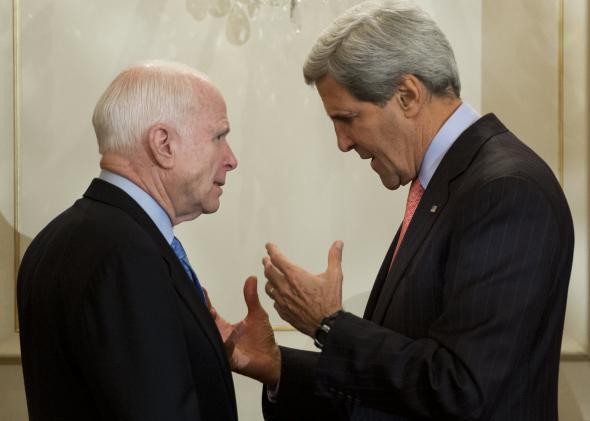In the tense and uncertain days leading up today’s announcement of a framework agreement to limit Iran’s nuclear program, only one thing was known for sure: Whatever deal was reached, those who favored negotiations from the beginning would hail it as an important step to prevent war, and those who opposed talks from the beginning would decry it as a shameful capitulation to an untrustworthy regime.
As one of the guiding lights of the latter group, Senate Republican Tom Cotton, who set off a fracas last month with a letter to Iran’s leaders informing them that Republicans could scuttle any deal the administration agreed to, described today’s agreement as “a list of dangerous U.S. concessions that will put Iran on the path to nuclear weapons.”
What’s interesting about some of the Republican responses so far, though, is that much of the criticism focuses not on the nuclear issue itself but on Iran’s broader role in the Middle East. Cotton writes, “These concessions also do nothing to stop or challenge Iran’s outlaw behavior. Iran remains the world’s worst state sponsor of terrorism. Iranian aggression is destabilizing the Middle East. And Iran continues to hold multiple Americans hostage.”
In his statement, House Speaker John Boehner said that “After visiting with our partners on the ground in the Middle East this week, my concerns about Iran’s efforts to foment unrest, brutal violence and terror have only grown.” And before the deal was announced, when things weren’t looking good, Sen. John McCain said that the faltering talks demonstrated that “Any hope that a nuclear deal will lead Iran to abandon its decades-old pursuit of regional dominance through violence and terror is simply delusional.”
The comments suggest that the Republican campaign against the deal will focus less on centrifuge numbers and uranium levels than on the larger balance of power in the Middle East and on combating the increasing perception that U.S. and Iranian interests are aligning in the fights against ISIS in Iraq and al-Qaida in Yemen. This notion of shared U.S. and Iranian interests has deeply alarmed Sunni Arab governments and Israel. Benjamin Netanyahu addressed it directly in his speech to the U.S. Congress last month, saying, “the enemy of your enemy is your enemy.”
This argument takes it as a given that the Obama administration wants to seek a long-term alliance with Iran, though White House officials would never put it that way and are always quick to refute the notion that the two countries are fighting on the same side.
Sen. Mark Kirk may have addressed the issue most directly in a speech in Chicago today, saying, “There is a perception right now in the Persian Gulf that the United States is allied to Iran. That is undermining our ability to work with Arab countries in that area. I would say that in the wreckage of this cave, there’s going to be a lot of work to be done to overcome the perception that the U.S. is allied with Iran.”
In some sense, this is all strawmanship. Even the most optimistic advocates of a nuclear deal don’t envision Iran and the U.S. becoming best pals, or Iran magically turning into Canada. But the comments also suggest that the debate over the nuclear deal is just a prelude to a much larger and likely even more rancorous and partisan debate about America’s shifting alliances and interests in the Middle East.
